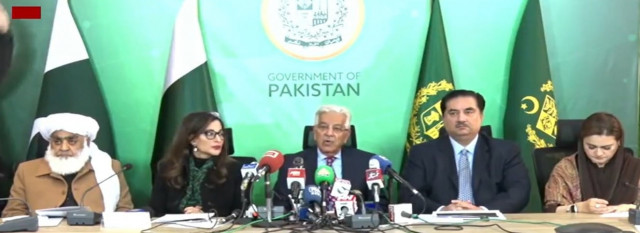Govt unveils energy conservation plan
Federal cabinet approves measures at shutting malls, markets early

The federal cabinet on Tuesday approved the National Energy Conservation Plan, introducing certain measures to ensure judicious utilisation of national resources, including early closure of markets and restaurants and stopping unnecessary use of electric appliances in all government offices.
In a meeting, chaired by Prime Minister Shehbaz Sharif, the cabinet decided to implement the Energy Conservation Plan across the country with immediate effect on the advice of the Power Division. The government hoped the plan would ensure saving worth hundreds of billions of rupees.
Unveiling the salient features of the austerity plan at a media briefing after the cabinet meeting, Defence Minister Khawaja Asif said that energy saving reforms were being introduced across the country. He urged the people to change their habits in order to conserve energy.
“We need to change our lifestyle with reference to the use of energy. Our habits are different from the rest of the world. We generate our own energy, instead of natural energy, which incurs production cost,” the defence minister told reporters.
According to the energy conservation plan, restaurants, hotels, and markets would close by 8:30pm, while wedding halls by 10pm. Besides, the production of incandescent light bulbs and inefficient electricity fans would be stopped. The government also planned to levy additional duty on inefficient electric fans.
“With this initiative [early markets closure], which has been taken in consultation with trade bodies, there will be a saving of around Rs62 billion [annually],” Asif said. “The plan has been discussed with the business community and they agree to this initiative,” he added.
“The production of inefficient electricity fans will be stopped from July 1 and additional duty will be levied on them, which will help save Rs15 billion. The manufacturing of incandescent light bulbs will also be stopped from the 1st of February. This will help save Rs22 billion.”
Asif announced a 30% reduction in electricity consumption at all the institutions of the federal government. “Unnecessary use of electrical appliances should be avoided in all offices,” he said, adding that all government institutions would use energy-saving devices.
Stressing that use of energy from natural resources, Asif revealed that the cabinet meeting on Tuesday was held in sunlight. “No light was lit by electricity during the cabinet meeting today,” he said. “We use 29,000 megawatts of electricity in summers and 12,000MW in the winter.”
“The fans alone consume 12,000MW of electricity. Most of them are inefficient, whereas energy-saving fans are available in the market,” he said. Similarly, he added, streetlights’ use would also be controlled to save the electricity.
“Streetlights will be operated at 50%, which will save Rs92 billion.”
The minister revealed that motorcycles alone across the country consumed fuel worth $3 billion annually. “E-bikes will be gradually introduced to reduce this fuel consumption, while conical baffles will be installed inside the geysers within a year to save gas.”
The defence minister said water rates would be reviewed in order to ensure conservation of water. He added that the building control authorities would bring necessary reforms in bylaws of housing societies to ensure efficient use of water.
The minister said that awareness campaign regarding energy saving would be launched through print, electronic and social media. He added that the Pakistan Electronic Media Regulatory Authority (Pemra) would ensure energy saving campaign through private TV channels and radio channels.
Responding to a question about work from home policy, Asif said that a committee, led by Prime Minister Shehbaz Sharif, would decide on the matter within 8-10 days. On the occasion, Climate Change Minister Sherry Rehman added that the work from home policy had resulted in energy saving and reduced pollution.
“This can be a successful strategy,” Rehman said. “Early closure of markets, use of alternative sources of energy and work from home policy will help improve the situation,” she added. “Saving in energy consumption will reduce the import bill which will benefit the economy.”
On this occasion, Energy Minister Engr Khurram Dastgir Khan said that the National Electric Power Regulatory Authority (Nepra) had conducted only one public hearing regarding solarisation. However, he added, there had been no order regarding net metering, therefore, tariff that was given to net metering in the summer.
The cabinet also approved reduction in the retail price of 20 medicines to provide relief to the common man, while the Federal Board of Revenue (FBR) had been directed to publish a separate tax directory of the parliamentarians, the ministers said, adding that at present, there was no plan to privatise any department.



















COMMENTS
Comments are moderated and generally will be posted if they are on-topic and not abusive.
For more information, please see our Comments FAQ